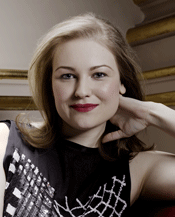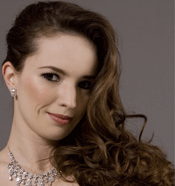17 Jun 2010
Polishing Gemstones — Jette Parker Young Artists
Opera stars are made as well as born. The Royal Opera House Jette Parker Young Artists Programme shapes the stars of the future.

Opera stars are made as well as born. The Royal Opera House Jette Parker Young Artists Programme shapes the stars of the future.
It’s funded by the Oak Foundation, and is an investment that's paid off handsomely. Some very important singers, such as Jacques Imbrailo and Marina Poplavskaya, are graduates of the scheme.
“We are like rocks”, says Simona Mihai, the young Romanian soprano who joined the scheme in 2008. “They are like jewelers. They grind us and shape us, so we are being polished Stage by stage, we’re being worked on, so we can sparkle, like gems”.
 Kai Rüütel
Kai Rüütel
“This is the most incredible opportunity” says Kai Rüütel, the Estonian mezzo soprano just at the end of the first year of the programme. “Never in my wildest dreams could I ever have hoped for something as good as this!”
The Jette Parker Young Artists Programme was created by the Royal Opera House, London as a specialist academy to support extremely gifted artists near the start of their careers. Young artists are given training in all aspects of performance. “They treat you like a person”, says Kai, “Everything is geared to what you need as an individual. If you need language coaching, you get a language coach. If you need to work on your technique, they have experts in that. If you want to study specific repertoire, they bring in people who can help.”
Nurturing young artists involves more than just technical support. “We get help with other things that let us develop well” adds Kai, “Personal training, stress management, all these things go into making you a good performer. So when you go on stage and sing, you don’t have to worry about anything except giving the best possible performance”.
 Simona Mihai
Simona Mihai
“And if you’re enjoying yourself, then the audience enjoys too”, adds Simona. Both women are vivacious. They complete each other’s sentences with enthusiasm. It’s a pleasure to see how the Programme has instilled values such as comradeship, because mounting an opera is a huge co-operative undertaking. “Everyone seems to forget that what goes on behind the stage is important, but everyone pulls together to make a performance work”.
“Costumes, wigs, makeup, of course," says Kai, “but also voice coaches, some of them spend months working, even before a new production” “And movement coaches, and fight directors” adds Simona, “And don’t forget stage hands and those who move the sets. They have to be quick, and quiet, and sometimes those sets are huge”.
“It’s always safety first in this House” adds Kai, “we are so well looked after”. I’ve heard singers and conductors praise the high standards at the Royal Opera House. many times, so it’s good to hear that the same quality of care extends at all levels.
“Everyone is so dedicated”, they chime. “Maestro Pappano, he’s so committed. He gets so much in to things, doesn’t stop to eat, but grabs a bite in between moments when he’s conducting”. Recently, Antonio Pappano made a series for BBCTV, “Opera Italia”. It was so inspiring that it’s brought many people to opera who might not have realized how exciting it could be.
Getting into the Jette Parker Young Artists Programme isn’t easy. All applicants must have solid professional experience. Only 75 applicants are called to audition, and only a dozen reach the final round. Each year, only about five singers are selected. Age limits aren’t defined, but these young artists have proved their worth even before entering the scheme. It’s a full time responsibility but gives singers the opportunity to take part in most productions at the Royal Opera House and cover major roles. In a few days time, Simona Mihai is covering Anna Netrebko as Manon. “She’s a great artist, so professional, it’s wonderful working with her”.
Because the Young Artists Programme includes all aspects of opera production, special events are included. Last year, for example, the programme presented The Truth about Love, a meditation based on Rilke, Britten and Schumann by Young Artist Steven Ebel, who writes as well as sings. Kai Rüütel sang Frauen-Liebe und Leben and Elisabeth Meister the Britten songs. (Simona was singing Despina touring with Glyndebourne). This July, all will be appearing together, with others on the scheme, in the Young Artists Summer Performance. It's an ambitious event which showcases what they've achieved.
Being in a programme as intensive as this is daunting. “We learn about our strengths and think of ways to deal with our weaknesses.” Both emphasize the importance of entering into character. “When I sing a role, I’m not myself, I am the role. I build the part with the help of the conductor and the director, so I hope that I can get the message through to the audience”, says Simona.
“I definitely need an emotional connection”, says Kai, who once wanted to be a Blues singer. “I have to feel and believe every word, and draw on an enormous emotional palette. That’s why I do this job, I want to give the audience an experience so they can forget their daily lives and see things through the character’s eyes and feel what the character is feeling. That’s my ultimate goal.”
The secret, both say, is in preparation. “It’s like being in a kitchen”, says Simona, “You can’t suddenly come out, ‘Voilà, here’s the turkey!’. You have to prepare it properly or it won’t be good.”
They plan thoroughly, reading the score completely, and the novel behind it if there’s one, learning the meaning even when they learn the words phonetically. “Language coaches are wonderful”, says Kai, whose English is flawless. “If it’s a period production, we go to the National Gallery to look at the paintings and see how people carried themselves, sat, moved”, adds Simona, “Posture was different than it is now”, she demonstrates, sitting bolt upright. “It’s research, like university!” grins Kai.
The Young Artists Programme continues to nurture its graduates as they progress into their career “Whenever we are in London, we’re welcome to come back and work with our coaches again, after the current Young Artists are looked after”. This is valuable. because no good artist ever stops developing. It benefits Young Artists past and present at the same time.
Simona Mihai wants to sing a wide range of repertoire, rather than a narrow niche. She’s fascinated with The Governess in The Turn of the Screw and sang it at college and in Santiago. “I want to sing it again and again, there’s so much in it. I love Britten”, she said heartfully. Later she started singing impromptu a Mandarin song she learned when she lived in China when she was young. Perfect intonation, good accent, no problems adjusting to the different tonality. I was very impressed. “She’s ready! “ beamed Kai.
“For me this is the best job in the world”, says Kai Rüütel, “I want to sing big dramatic roles, but there are no ‘small roles’. All roles play an important part and you can make them work. I get so much happiness singing that I feel fulfilled whenever I can communicate. She’s statuesque and a natural actor. Going through the Jette Parker Young Artists Programme makes dreams possible.
For more information, please see the Royal Opera House site and read about Simona Mihai and Kai Rüütel below.
Anne Ozorio
Simona Mihai was born in Bucharest and studied at the Royal College of Music as a Queen Mother Scholar, Samling Foundation Scholar, Rosemary Budgen Junior Fellow and David Bowerman Junior Fellow. Numerous singing prizes include first prize in the Takasaky International Competition in Japan, the Kathleen Ferrier Bursary for Young Singers, the National Mozart Competition, the Miriam Licette Prize in conjunction with the Maggie Teyte Scholarship, the Joaninha Trust Award and the Clonter Opera Prize.
She’s appeared professionally many times since college, including Celia Lucio Silla with the European Opera Company, Roksana King Roger at the Teatro Massimo, Palermo, Governess The Turn of the Screw at Teatro Municipal de Santiago,Virtù and cover Poppea L’incoronazione di Poppea for Glyndebourne Festival Opera (and at the Proms) and Despina Così fan tutte for Glyndebourne on Tour. She’s given recitals throughout the UK, Europe, in Japan and the US.
She’s in her second year in the Programme, and has sung Dew Fairy and Echo Hänsel und Gretel, followed by Belinda Dido and Aeneas, Juliette Die tote Stadt and 15-Year-Old Girl Lulu. She also covered Giannetta L’elisir d’amore and Oscar Un ballo in maschera, Gaudy Lady The Gambler, Pepik The Cunning Little Vixen and Poussette Manon and cover title role The Cunning Little Vixen, title role Manon and Anne Trulove The Rake’s Progress.
Kai Rüütel has just completed her first year on the Programme. She won the national competition for classical singers in Estonia for three successive years, before studying at Koninklijk Conservatorium Den Haag. She received a Master’s degree with special honours from the Dutch National Opera Academy. She has sung Dorabella Così fan tutte, Ottavia and Virtù L’incoronazione di Poppea, Zerlina Don Giovanni, Mère Marie Dialogues des Carmelites and Carmen La tragedie de Carmen for Dutch National Opera Academy, Venerable Lady The Gambler (also covering Blanche), at the Royal Opera House, followed by Rosette Manon and Flora La traviata.